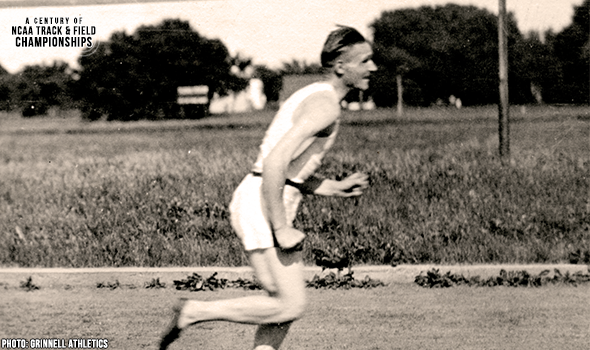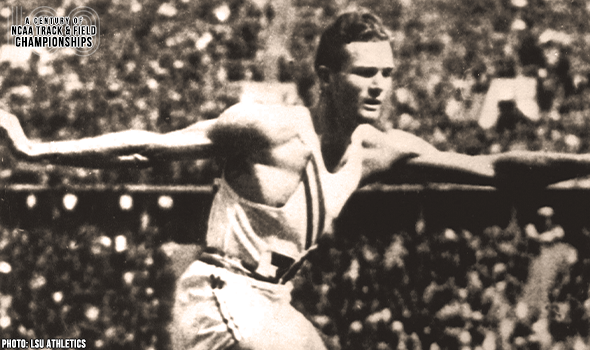
ON THIS DAY: Kerley Set 400-Meter CR In Austin
Going into the 2017 outdoor season, no collegian had gone sub-44.00 in the 400 within the confines of the collegiate season. Quincy Watts of Southern California held the collegiate record at that exact mark since his victory at the 1992 NCAA Division I Outdoor Track & Field Championships in Austin, Texas.
Indoors, Fred Kerley of Texas A&M made his presence felt that year with a few of the fastest marks in collegiate history. Kerley ripped two laps in 45.02 in his season opener at the Clemson Tiger Paw for what was the No. 3 spot on the all-time chart. Fast forward to the postseason and Kerley lowered his PR to 44.94 at the SEC Indoor Championships, in turn setting an all-time collegiate best on an oversized track. Then, Kerley went even faster in front of his home crowd at the NCAA Indoor Championships, winning the 400-meter title in 44.85 to become the fourth-fastest man in world history.
Get your popcorn ready, folks. It’s about to get good.
Even though Kerley didn’t make his outdoor debut until mid-April at the Michael Johnson Classic, he didn’t show any signs of rust. Kerley stopped the clock at 44.60 for what was the third-fastest mark in collegiate history that early in the season (The only two men two who ran faster were Vernon Norwood of LSU in 2015 at 44.44 and Watts in 1992 at 44.46).
Magic followed three weeks later at the SEC Outdoor Championships, where Kerley scorched a 44.09 in the prelims for the second-fastest, in-season collegiate performance behind Watts’ near 25-year-old record. Read that again, though: Kerley did that in the prelims.
After winning the SEC title at 44.30 – a time slowed by inclement weather, in which Kerley said he “didn’t adjust anything … but I was racing, instead of just running my race today” – he turned his attention to the all-important NCAA postseason.
Getting to the quarterfinals of the NCAA DI West Preliminary Round in Austin, Texas, proved easy for Kerley, as he clocked a comparatively-pedestrian 45.95 to win his first-round section.
Given the high-stakes nature of the ensuing afternoon, Kerley had a championship mindset.
“I was running smart yesterday to set up the race for today,” Kerley said after the meet. “Coach (Alleyne) Francique and I were talking about the collegiate record being set in Austin and it would be wonderful to break it here in front of him. I just want to keep on improving.”
Everybody in attendance at Mike A. Myers Stadium – including Watts, then and now an assistant coach at Southern California – knew what was coming next. On May 26, 2017, exactly four years ago today, Kerley covered 400 meters in 43.70 to demolish Watts’ collegiate record and become the seventh-fastest man in world history.
Several weeks later, Kerley completed the NCAA sweep with a 44.10 effort at Historic Hayward Field and anchored the Aggies to 4×400 relay glory with a 43.99 split. Kerley’s margin of victory in the 400 was 0.59 seconds, the largest in meet history since 1992 (If you don’t know who won that race, then you haven’t been paying attention: Quincy Watts by 0.84 seconds).
The NCAA and collegiate track & field will mark a momentous milestone in the spring of 2021 -- the 100th anniversary of the NCAA Championships and with that, the NCAA Track & Field Championships. In June 1921, the University of Chicago hosted the first track & field championships in NCAA history.
This point can’t be emphasized enough: Not only was the event the first for NCAA track & field, but the first championships for any sport under the sponsorship of the NCAA.
To celebrate, over each of the next 365 days, the U.S. Track & Field and Cross Country Coaches Association (USTFCCCA) will celebrate moments, student-athletes, and coaches that have made a century’s worth of championships special. From humble beginnings to important historical milestones to the modern-day, collegiate track & field has evolved with the American society.
The 2021 edition of the NCAA Division I Outdoor Track & Field Championships begin with preliminary round action on May 27-29 in Jacksonville, Fla., and College Station, Texas. The championships final site and culmination of the celebration is slated for June 9-12, 2021 at the newly rebuilt Hayward Field in Eugene, Ore.

SIU’s Roggy Dominated The Javelin In 1978
Bob Roggy won the javelin title at the 1978 NCAA DI Outdoor T&F Championships by more than 20 feet. Roggy qualified first for the final with a MR heave of 89.30m (293‑0).

Makusha Made History In Bowerman Year Of 2011
Ngoni Makusha became just the fourth man in meet history to win individual titles in both the 100 and LJ. It was his 3rd career LJ crown and he set a CR in the 100 of 9.89.

George Mason’s Gage Shocked The NCAA LJ In 1988
Nena Gage won the long jump at the 1988 NCAA DI Outdoor T&F Championships in a shocking upset over Gail Devers.

Texas’ Thompson Marveled In NCAA Distance Events
Jerry Thompson won three career distance titles at the NCAA Outdoor T&F Championships. His first came in 1943. Then he won again in 1947 & 1948 after serving in World War II.

Grinnell’s Paulu Sprinted To NCAA History
Leonard Paulu was the first athlete to complete the 100-200 double in NCAA Outdoor Track & Field Championships history in 1922. That also made him the 1st to win back-to-back 100 titles, too.

Scott Won Back-To-Back NCAA Hammer Titles
Candice Scott won back-to-back hammer throw titles at the NCAA DI Outdoor T&F Championships in 2003 & 2004. Scott set a meet record of 69.77m (228-11) in that first year.

Drouin Soared To The Bowerman In 2013
Derek Drouin won two career HJ titles at the NCAA DI Outdoor T&F Championships. When Drouin won in 2013, he was only the fourth man to clear 2.34m (7-8) in meet history.

Watts Made Quick Work Of NCAA 400
Quincy Watts set a meet record in the 400 of 44.00 at the 1992 NCAA DI Outdoor Track & Field Championships. It lasted 25 years until 2017.

Iowa State’s Koll Rolled To 5K-10K Crowns
Lisa Koll won three career titles at the NCAA DI Outdoor T&F Championships in dominant fashion. Her average margin of victory in those 5K & 10K races was 37.73 seconds.

LSU’s Hardin Completed Unique 440-220H Double Twice
The nearly unheard of 440-220H double was so nice that Glenn Hardin did it twice! Hardin became the first to do so in meet history in 1933 and then swept them again in 1934.

